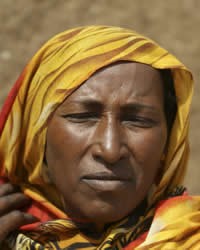Beja, Beni Amer in Sudan

Photo Source:
www.j-pics.info - Flickr
Creative Commons
|
Send Joshua Project a map of this people group.
|
| People Name: | Beja, Beni Amer |
| Country: | Sudan |
| 10/40 Window: | Yes |
| Population: | 471,000 |
| World Population: | 754,000 |
| Primary Language: | Bedawiyet |
| Primary Religion: | Islam |
| Christian Adherents: | 0.00 % |
| Evangelicals: | 0.00 % |
| Scripture: | Portions |
| Ministry Resources: | No |
| Jesus Film: | Yes |
| Audio Recordings: | Yes |
| People Cluster: | Beja |
| Affinity Bloc: | Horn of Africa Peoples |
| Progress Level: |
|
Introduction / History
The Beja are a group of nomadic shepherds who live scattered across the desert regions of Sudan, Egypt and Eritrea. The Beja are an important people group and represent the largest non-Arabic ethnic group between the Nile River and the Red Sea.
The Beja claim to be the descendants of Noah's grandson, Cush (son of Ham). They have occupied their current homelands for more than 4,000 years. They inhabit over 110,000 square miles (284,800 square km) in eastern Sudan. The Beja in Sudan are divided into four tribes: the Hadendowa, the Amarar, the Ababda, and the Beni Amer. Those who don't fall into these four are given the generic name Bedawi Beja, since their language is called Bedawiyet.
What Are Their Lives Like?
The Bedawi Beja are traditionally nomadic shepherds who migrate annually with their herds. In the north, small groups of nomads raise flocks of sheep, goats, camels, and cattle. Some of the Beja have become more settled and engage in some farming, usually sorghum. The farmers who live along the Red Sea Coast and the Atbarah River raise commercial crops such as cotton and grains, while herding their flocks.
Bedawi Beja nomads live in portable tents that are put up and dismantled by the women. The tents are curved in shape and are made of woven palm fronds. The more settled farmers live in mud-walled houses.
The daily diet of the Bedawi Beja consists of dairy products (especially camel's milk), beef, and some grain. They traditionally wore animal skin clothes; however, today, they wear manufactured clothing. They are dependent on cash to purchase clothes and other desired goods. Their view of the "good life" is to have large herds and to live in green, well-watered pastures.
Each Beja clan is named after their ancestors, and the line of descent is traced through the males. Each clan has its own pastures and water sites that may be used by others with permission. Clans vary from one to twelve families. Disputes between clans are often settled by traditional Beja law; but most day-to-day affairs are managed by the heads of the families. The Beja are a hospitable people, always showing kindness to other clans; however, they are not necessarily friendly to foreigners.
Bedawi Beja prefer cross-cousin marriages. After a marriage contract has been made, a large gift of livestock, clothing, and other goods is given to the bride's family. The goal of young couples is to have many male children and to acquire a great number of female camels. Only the wealthiest Bedawi Beja men more than one wife.
What Are Their Beliefs?
Virtually all of the Beja are Muslims; however, they practice what is known as "folk Islam." Their beliefs are interwoven with a rich variety of traditional beliefs. For example, they believe that men have the power to curse others by giving them the "evil eye." They also believe in wicked jinnis (spirits capable of taking on animal forms) and other invisible spirits. They believe that evil spirits can cause sickness, madness, and accidents. They have adopted many Islamic practices such as repeating prayers, but these prayers are not largely understood.
What Are Their Needs?
There are only a small handful of Beja believers, and probably none among the Bedawi subgroup. Evangelistic tools, added laborers, and increased intercession are the keys to reaching them with the gospel of Christ.
Prayer Points
Ask God to raise up prayer teams that will break up the ground through worship and intercession.
Pray for God to speed the completion of evangelistic materials into the Bedawiyet language.
Pray for Bedawiyet elders and family leaders to have dreams of the risen Christ that will draw them and their families into faith.
Ask the Lord to raise up strong fellowships of believers among the Bedawiyet Beja.